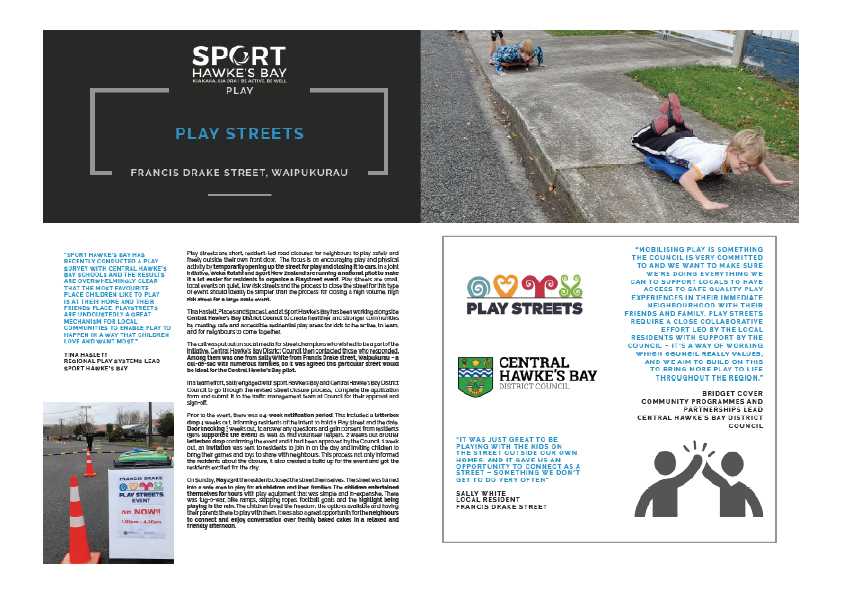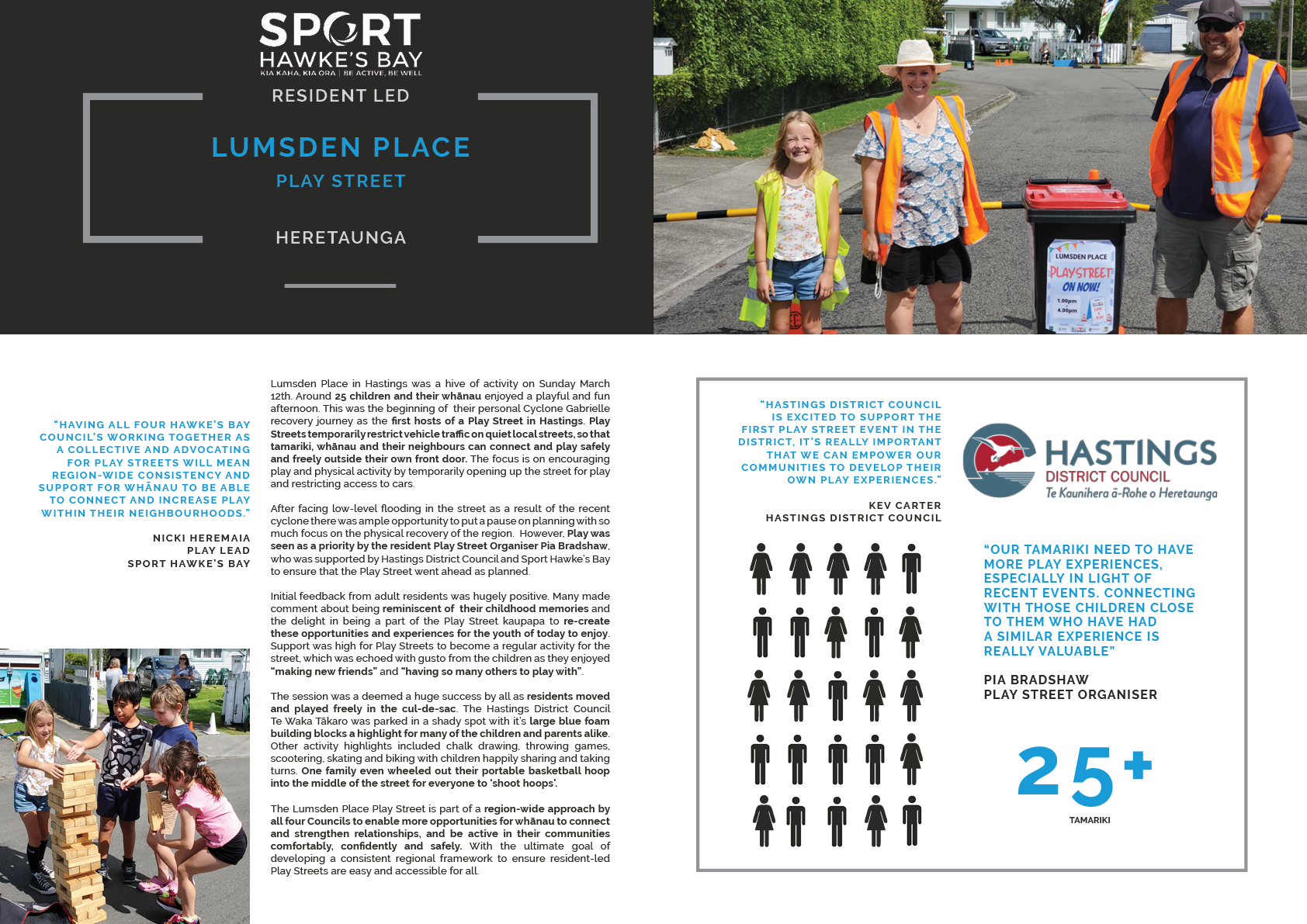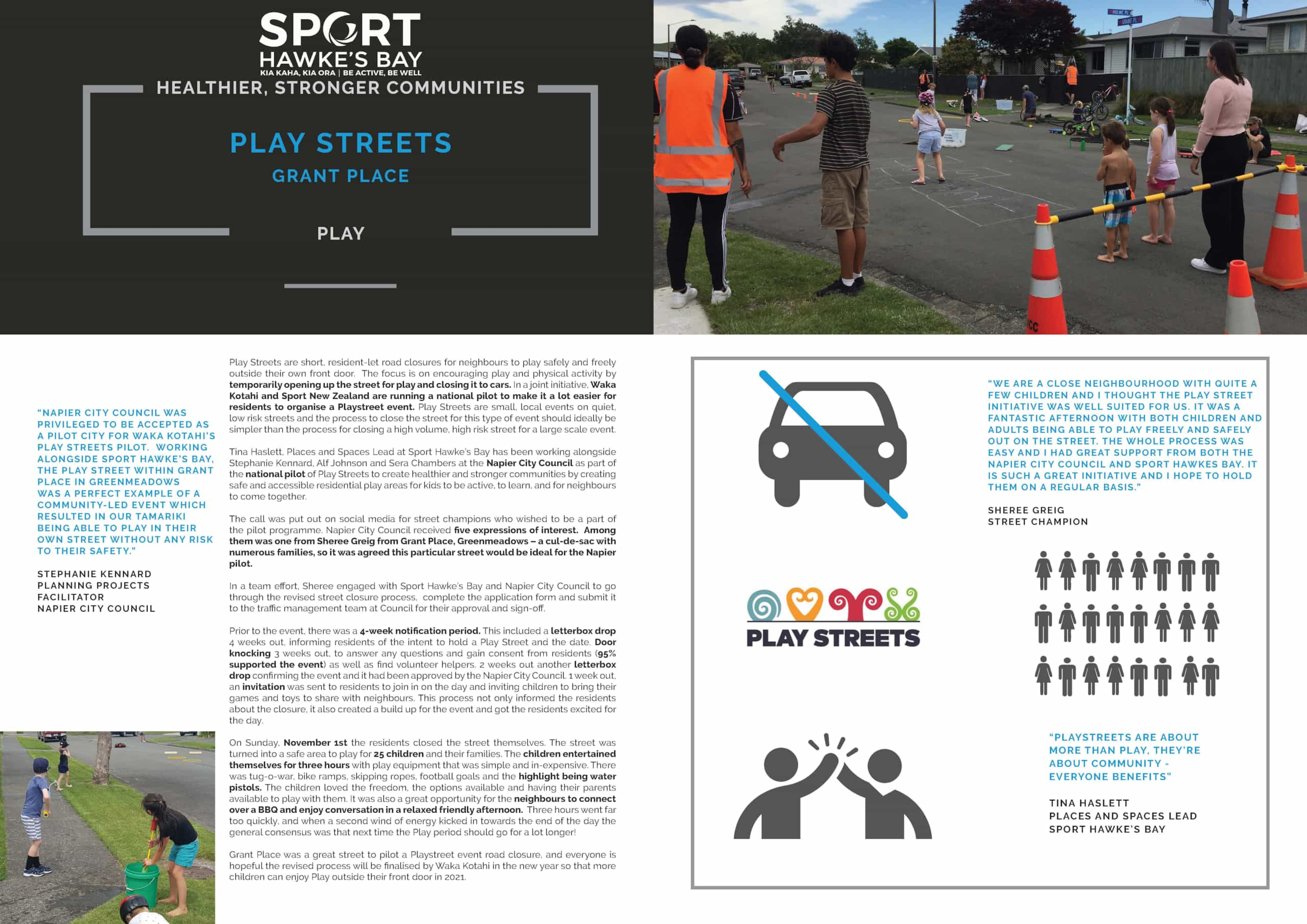
Kia Kaha Ake, Kia Nui Ake, Te Tokomaha Ake
More People, More Active, More Often




Transform your street into a place for play
Imagine your neighbourhood street transformed into a lively, buzzing playground. Where, for a few hours, cars give way to chalk, neighbours emerge from behind closed doors, and the street becomes a stage for imagination and connection.
What is a Play Street?
Play Streets provide a safe environment for children and parents to be active in their neighbourhood through play and social engagement with their neighbours. They are small, resident-led, local events held on quiet neighbourhood streets during daylight hours. Temporary vehicle restrictions make it easier for residents to organise their own play street events compared with larger-scale events.
Play Streets have become really popular in Australia, the United States and the United Kingdom. Sport NZ and Waka Kotahi have been working closely together, alongside councils, Regional Sports Trusts and other partner organisations, to make it easier for Play Streets to happen in Aotearoa.

Play Streets are a fun way for tamariki, rangatahi and whānau to play outside, be active, get to know each other, and promote better connected neighbourhoods. There are lots of benefits for everyone taking part – whether you’re a parent or caregiver, neighbour or tamariki.

Getting started
Organising a Play Street is easier than you might think. By following the straightforward steps below, or by downloading the toolkit, you can create a fun and safe environment for your community to enjoy. The process, from submitting your application to receiving the necessary consent, typically takes around four to six weeks.
Step One
Work out if your street is suitable for a Play Street event.
Not all streets are suitable, but quiet local streets such as cul-de-sacs are generally ideal. When considering whether your street would make a great Play Street, think playful, quiet, and low-risk.
Step Two
Contact our Play Lead to discuss your Play Street event.
Check with our Play Lead to see if your council supports Play Streets. Our Play Lead will guide you through completing a Play Street application, and the Health and safety requirements you need to know about.
Step Three
Get your neighbours on board.
Once you're clear on council requirements and whether your street is suitable for a Play Street, it's time to reach out to your neighbours. Let them know you'd like to hold a Play Street and get them excited and involved.
Step Four
Organise the date and time for your Play Street.
Councils need a lot of lead time, to notify groups like Emergency Services, so it is key to plan ahead.
You can find out from your neighbours a date that would suit most people to hold the Play Street.
A quiet time of day is ideal—when the movement of traffic and people is minimal, like Sunday afternoon, compared to a busy Saturday morning, when there is lots of traffic as people are out and about with Saturday activities and sports.
Step Five
Apply for a Play Street based on the previous steps.
You can now apply as you have gathered everything you need for your Play Street to take place.
Your council will require you to complete an Application Form and a Health and Safety Plan for Play Street. Don’t worry—this isn’t hard. We have a dedicated regional play lead who can help and answer your questions.
Step Six
Your Play Street is approved – double-check your responsibilities.
When your council lets you know your Play Street has been approved, it will also give you further guidance on the requirements that you need to put in place.
For example, you may need to put up signs at the entrance(s) to the Play Street, have marshals available to greet people and manage any vehicles, and have signals for clearly starting and ending the play session. It’s really important to follow these requirements.
As the Play Street organiser, make sure you understand what your responsibilities are. The council will let you know what these are, and they should be included in the application process. If you are unsure, please ask your council to clarify.
Step Seven
Send invites to your neighbours and organise activities.
Once all your Play Street requirements are in place, it’s time to invite your neighbours and start planning activities.
Planning play activities can be as easy as seeing what play gear your neighbours can bring for everyone to use. Check out the Play Trailer available for both Hastings and Central Hawke's Bay residents. You can also reach out to sports clubs or Sport Hawke's Bay to see if they can support you with inclusive play gear or activities on the day and have a look at the toolkit for Play ideas.
Keep your activities as simple and sustainable as possible.
You’re now ready to have your Play Street – enjoy!
Frequently Asked Questions
Play Streets provides various benefits to those participating, whether you’re a parent or caregiver, neighbour or child. The positives go much further than fitness and fresh air.
1. Play Streets evoke our creative side – getting us to reimagine how we use our streets during these events and how we can realise more play opportunities in our natural environment and everyday lives.
2. The right to play – It’s every child’s right to play and enjoy the outdoors, which helps with their development. Street play gives children a space to be independent and explore their own ideas without direction from adults.
3. An opportunity to connect with our community – Street play provides a perfect opportunity to get to know our neighbours, build trust and have a sense of connection through whakawhanaungatanga.
4. An active New Zealand – Play Streets create a safe environment for children to play, make friends, learn new skills and explore. It’s not often we can turn a suburban street into a free-play area for a day that provides a great opportunity for kids to connect with their local areas.
5. Supporting wellbeing – Play Streets are all about connection, getting moving, enjoying the environment and having fun – all elements that have a huge impact on our physical, social and mental wellbeing for both children and adults.
To alleviate any concerns, ensure residents are reminded about the time and date of the Play Street so they can ensure their cars are put in their garages or parked further away from the Play Street.
Carefully consider the types of play activities being provided. For example, for street cricket use a tennis ball instead of a hard ball.
Emergency services will have access during a Play Street. A process will be in place for marshals to safely guide the emergency vehicle through the play area.Visitors or delivery people are recommended to walk into the street from outside the Play Street closure area. There will be some situations where they will be able to drive up, once play is cleared.
While parents/caregivers are encouraged to give tamariki regular opportunities to play outside, including going to the park, we have seen in recent research:
- there is fear of young people going to the park alone
- younger children need adult supervision
- parents need to make the time to take tamariki to the park, and have conflicting priorities.
A Play Street not only promotes play, it also promotes neighbourhood connection and community resilience. It provides an opportunity for neighbours to meet each other, including people who may live alone, or those who are less likely to find it easy or suitable to play in a park.
For more on this, check out Playing Out.
It really shouldn’t be a major inconvenience as residents can still drive in and out during the session if they need to, just at walking speed to make it safe for everyone. For those not living on the street, it will usually only mean a tiny addition to journey times – we have no specific right to drive down a particular street. Most sessions only last an hour or two and take place before rush hour and at weekends. If you do have concerns, do talk to the organisers about them and hopefully you can reach a solution. You may well find it easier than normal to park on the street, since only residents will be allowed in and out during the sessions.
‘Playing Out UK’ research showed that young children can understand the difference between an event with a road closure and normal circumstance, through for example seeing road cones and adults wearing
high-vis vests.
A Play Street is an opportunity for parents to talk to children about road safety and the danger of traffic, and an opportunity for adults to take responsibility of driving behaviours on neighbourhood streets.
It is their choice to engage with Play Street. Councils may set a benchmark for how many residents need to support it before it can proceed (for example, 80%).
If a resident doesn’t want to engage in the Play Street, they could:
- stay inside at home
- make plans to be away for the duration of the Play Street
- still leave and come back to their street, understanding their car will be guided through the restriction area.
- move their car outside of the restriction area before the Play Street begins, so they can go about their business.
Previous Play Streets



SPONSORS





 Admin Login
Admin Login